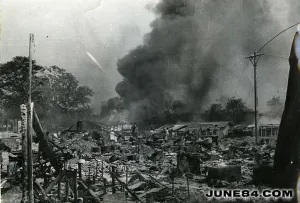No More Mistakes with Flour Mill Machine Manufacturer
Mar 11 2023

The June 84 tragedy stands as a defining moment in Sikh history—a moment not just of military action, but of irreversible cultural and emotional loss. It began as a state-led operation in India, but quickly escalated into one of the most devastating episodes for Sikhs worldwide. The event altered the course of Sikh identity, politics, and the quest for justice.
This article takes a deeper look at what happened during June 84, how it continues to shape Sikh consciousness, and why the term june84 remains a powerful digital and global movement even four decades later.
In the early 1980s, tensions in Punjab were growing due to political unrest, demands for Sikh autonomy, and rising religious militancy. The Indian government accused Sikh preacher Jarnail Singh Bhindranwale and his followers of using the Golden Temple complex as a base for separatist activity.
In response, the Indian Army launched Operation Blue Star in June 1984—a large-scale assault aimed at capturing or killing Bhindranwale and his armed followers. Tanks and armed troops were deployed to the sacred Golden Temple, the holiest place for Sikhs.
The assault began on June 1st, 1984, and escalated in intensity over the following days. The final offensive was executed on June 5–6, resulting in catastrophic destruction, including the heavy shelling of the Akal Takht, hundreds of civilian casualties, and the killing of Bhindranwale himself.
The destruction during June 84 wasn’t just military—it was deeply spiritual. The Akal Takht, an important symbol of Sikh sovereignty, was riddled with bullets. The holy scriptures, historical manuscripts, and rare relics were either destroyed or lost in the chaos.
Thousands of innocent pilgrims who had gathered at the Golden Temple for a religious occasion were caught in the crossfire. The Indian media offered little real-time coverage, and official narratives downplayed the scale of civilian deaths, igniting suspicion and resentment among Sikhs worldwide.
The operation not only crushed a political rebellion but also broke the trust between Sikhs and the Indian government, leading to long-standing feelings of betrayal, anger, and trauma.
The cycle of violence did not end in June. On October 31, 1984, then Prime Minister Indira Gandhi was assassinated by two of her Sikh bodyguards in retaliation for the Golden Temple assault. This act unleashed a horrifying wave of anti-Sikh riots across India, especially in Delhi.
For nearly three days, mobs—allegedly aided by political leaders—roamed Sikh neighborhoods. They burned homes, looted shops, murdered thousands of men and boys, and committed sexual assaults against women. Police either stood by or were complicit.
These events further solidified June 84 as not just a military operation, but the beginning of systemic persecution of an entire community.
In the aftermath of these atrocities, a digital and educational movement emerged under the term june84. It goes beyond a date; it’s now a global identifier for resistance, truth-telling, and community healing.
Websites like june84.com serve as hubs of memory, truth, and justice. These platforms host testimonies from survivors, rare photos, legal documents, and historical analysis that challenge the sanitized version of history promoted by mainstream outlets.
The online presence of june84 ensures that the tragedy is not forgotten. It invites people—especially younger Sikhs—to learn, reflect, and advocate.
The Sikh diaspora played a critical role in bringing global attention to the massacre. Protests erupted in major cities like London, Toronto, and San Francisco. Sikh communities abroad organized seminars, wrote books, and funded documentaries to document what really happened.
Human rights organizations also took note. Though international pressure failed to bring the accused perpetrators to justice in India, it helped raise awareness about the impunity enjoyed by those responsible.
Even today, Sikh groups continue to demand an independent investigation and justice for the victims of June 84 and the 1984 riots.
If you're wondering how you can contribute to preserving the legacy of june84, here are practical ways:
Educate Yourself: Start with resources like june84.com to understand the historical context and real accounts.
Share the Truth: Use social media to spread verified facts and survivor stories.
Attend Commemorations: Join your local Gurdwara’s June 1984 remembrance events.
Support Legal Advocacy: Contribute to efforts seeking reparations and official acknowledgment.
Create Dialogue: Engage in interfaith and inter-community discussions to foster empathy and understanding.
These actions help keep the memory alive and push society toward justice and reconciliation.
Decades have passed, but June 84 remains a living history. It’s not just about one operation or one community. It's about how states treat minorities, how sacred places should be respected, and how silence can perpetuate injustice.
Young Sikhs today are reclaiming their narrative, using platforms like june84 to re-educate themselves and others. Their activism is focused not just on remembering, but on ensuring such events never happen again.
The lessons from June 84 remind us that human rights violations must never be normalized, no matter the political justification.
Moving forward doesn’t mean forgetting. It means acknowledging the truth, honoring the victims, and making sure history doesn’t repeat itself. The legacy of june84 is not only a call for justice, but a commitment to peace, equity, and resilience.
Sikhs around the world continue to heal—but they do so with purpose. Their strength lies in memory, in truth, and in the power of community action.
To engage with june84 is to stand against silence, to uplift the unheard, and to work toward a future where no one is persecuted for their identity or beliefs.
Social Media Marketing Strategies for Beginners
Mar 14 2023
(0) Comments